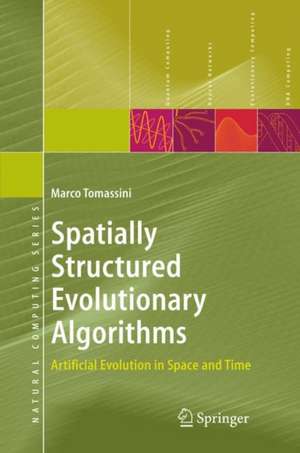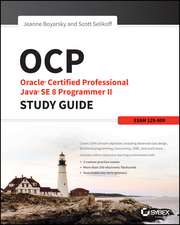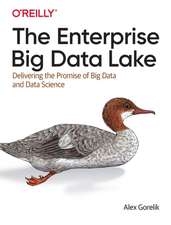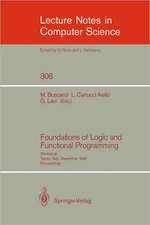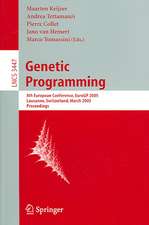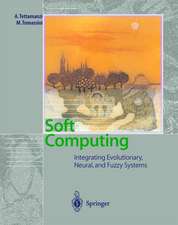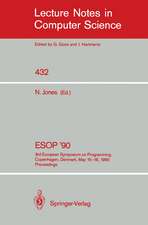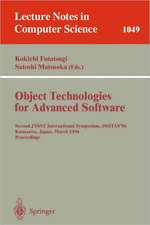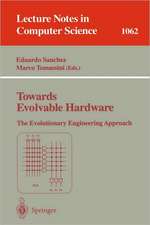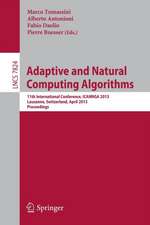Spatially Structured Evolutionary Algorithms: Artificial Evolution in Space and Time: Natural Computing Series
Autor Marco Tomassinien Limba Engleză Hardback – 27 sep 2005
The book should be of interest to advanced undergraduate and graduate students working in evolutionary computation, machine learning, and optimization. It should also be useful to researchers and professionals working in fields where the topological structures of populations and their evolution plays a role.
| Toate formatele și edițiile | Preț | Express |
|---|---|---|
| Paperback (1) | 328.09 lei 6-8 săpt. | |
| Springer Berlin, Heidelberg – 21 oct 2010 | 328.09 lei 6-8 săpt. | |
| Hardback (1) | 332.71 lei 6-8 săpt. | |
| Springer Berlin, Heidelberg – 27 sep 2005 | 332.71 lei 6-8 săpt. |
Din seria Natural Computing Series
- 20%
 Preț: 507.38 lei
Preț: 507.38 lei - 20%
 Preț: 305.91 lei
Preț: 305.91 lei - 20%
 Preț: 992.26 lei
Preț: 992.26 lei - 20%
 Preț: 617.14 lei
Preț: 617.14 lei - 20%
 Preț: 645.47 lei
Preț: 645.47 lei - 20%
 Preț: 642.65 lei
Preț: 642.65 lei - 20%
 Preț: 998.04 lei
Preț: 998.04 lei - 18%
 Preț: 963.60 lei
Preț: 963.60 lei - 20%
 Preț: 655.20 lei
Preț: 655.20 lei - 20%
 Preț: 615.70 lei
Preț: 615.70 lei - 20%
 Preț: 645.65 lei
Preț: 645.65 lei - 20%
 Preț: 640.19 lei
Preț: 640.19 lei - 20%
 Preț: 655.02 lei
Preț: 655.02 lei -
 Preț: 384.70 lei
Preț: 384.70 lei - 20%
 Preț: 652.54 lei
Preț: 652.54 lei - 20%
 Preț: 649.28 lei
Preț: 649.28 lei - 20%
 Preț: 330.75 lei
Preț: 330.75 lei - 20%
 Preț: 328.09 lei
Preț: 328.09 lei -
 Preț: 389.70 lei
Preț: 389.70 lei - 20%
 Preț: 644.66 lei
Preț: 644.66 lei - 20%
 Preț: 333.88 lei
Preț: 333.88 lei - 20%
 Preț: 1299.31 lei
Preț: 1299.31 lei - 20%
 Preț: 528.47 lei
Preț: 528.47 lei - 20%
 Preț: 648.11 lei
Preț: 648.11 lei - 15%
 Preț: 639.90 lei
Preț: 639.90 lei - 20%
 Preț: 322.43 lei
Preț: 322.43 lei - 20%
 Preț: 657.83 lei
Preț: 657.83 lei - 20%
 Preț: 659.31 lei
Preț: 659.31 lei - 20%
 Preț: 997.56 lei
Preț: 997.56 lei - 20%
 Preț: 508.61 lei
Preț: 508.61 lei -
 Preț: 400.85 lei
Preț: 400.85 lei - 20%
 Preț: 653.38 lei
Preț: 653.38 lei - 20%
 Preț: 308.60 lei
Preț: 308.60 lei - 20%
 Preț: 654.05 lei
Preț: 654.05 lei - 15%
 Preț: 652.17 lei
Preț: 652.17 lei - 20%
 Preț: 336.54 lei
Preț: 336.54 lei - 20%
 Preț: 656.19 lei
Preț: 656.19 lei
Preț: 332.71 lei
Preț vechi: 415.89 lei
-20% Nou
Puncte Express: 499
Preț estimativ în valută:
63.67€ • 66.23$ • 52.56£
63.67€ • 66.23$ • 52.56£
Carte tipărită la comandă
Livrare economică 15-29 aprilie
Preluare comenzi: 021 569.72.76
Specificații
ISBN-13: 9783540241935
ISBN-10: 3540241930
Pagini: 208
Ilustrații: XIII, 193 p.
Dimensiuni: 155 x 235 x 17 mm
Greutate: 0.43 kg
Ediția:2005
Editura: Springer Berlin, Heidelberg
Colecția Springer
Seria Natural Computing Series
Locul publicării:Berlin, Heidelberg, Germany
ISBN-10: 3540241930
Pagini: 208
Ilustrații: XIII, 193 p.
Dimensiuni: 155 x 235 x 17 mm
Greutate: 0.43 kg
Ediția:2005
Editura: Springer Berlin, Heidelberg
Colecția Springer
Seria Natural Computing Series
Locul publicării:Berlin, Heidelberg, Germany
Public țintă
ResearchCuprins
Setting the Stage for Structured Populations.- Island Models.- Island Models: Empirical Properties.- Lattice Cellular Models.- Lattice Cellular Models: Empirical Properties.- Random and Irregular Cellular Populations.- Coevolutionary Structured Models.- Some Nonconventional Models.
Recenzii
From the reviews:
"The focus of this very interesting book is on evolutionary heuristic algorithms and in particular those evolutionary algorithms that are ‘spatially structured’ which exhibit slightly different properties than standard evolutionary algorithms. The book starts with a very useful introduction on graphs and cellular models, where most of the terminology is laid out. … The book concludes with a detailed list of references and an index." (Efstratios Rappos, Zentralblatt MATH, Vol. 1089 (15), 2006)
"The strong points of the book is that it provides many variations in the structure of any EA, thus offering numerous options to consider when implementing an EA. This is very useful for anyone using EAs in practice. The book also contains a wealth of empirical data comparing the performance of these many variations … . The book is quite comprehensive and contains a wealth of very valuable information for any EA practitioner. The references are also very nice and varied." (Franklin A. Mendivil, Mathematical Reviews, Issue 2007 k)
"The focus of this very interesting book is on evolutionary heuristic algorithms and in particular those evolutionary algorithms that are ‘spatially structured’ which exhibit slightly different properties than standard evolutionary algorithms. The book starts with a very useful introduction on graphs and cellular models, where most of the terminology is laid out. … The book concludes with a detailed list of references and an index." (Efstratios Rappos, Zentralblatt MATH, Vol. 1089 (15), 2006)
"The strong points of the book is that it provides many variations in the structure of any EA, thus offering numerous options to consider when implementing an EA. This is very useful for anyone using EAs in practice. The book also contains a wealth of empirical data comparing the performance of these many variations … . The book is quite comprehensive and contains a wealth of very valuable information for any EA practitioner. The references are also very nice and varied." (Franklin A. Mendivil, Mathematical Reviews, Issue 2007 k)
Notă biografică
Marco Tomassini is a professor of Computer Science at the Information Systems Department of the University of Lausanne, Switzerland. He graduated in physical and chemical sciences in Mendoza, Argentina, and got a PhD degree in theoretical chemistry from the University of Perugia, Italy, working on computer simulations of condensed matter systems. His current research interests are centered around the application of biological ideas to artificial systems. He is active in evolutionary computation, especially spatially structured systems, genetic programming, and evolvable machines. He is also interested in machine learning, parallel cellular computing systems, and the dynamical properties of networked complex systems. He has been Program Chairman of several international events and has published many scientific papers and several authored and edited books in these fields.
Caracteristici
Uses graph concepts as a unifying theme to express the state of the art in spatially structured evolutionary algorithms Includes new material on non-standard networked population structures such as small-world networks This is the first book devoted to spatial and temporal aspects of genetic algorithms Useful to a broad readership of students and researchers in fields involving the topological structures of populations and their evolution Includes supplementary material: sn.pub/extras
